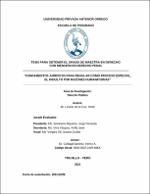| dc.contributor.advisor | Carbajal Sánchez, Henry A | |
| dc.contributor.author | Linares de la Cruz, Heidi | |
| dc.creator | Linares de la Cruz, Heidi | |
| dc.date.accessioned | 2022-02-16T03:04:59Z | |
| dc.date.available | 2022-02-16T03:04:59Z | |
| dc.date.issued | 2022 | |
| dc.identifier.uri | https://hdl.handle.net/20.500.12759/8670 | |
| dc.description.abstract | La problemática desarrollada en la investigación está referida al indulto por razones
humanitarias regulado en el Reglamento Interno de la Comisión de Gracias Presidenciales,
aprobado mediante Resolución Ministerial Nº 0162-2010-JUS y que si bien con motivo de
la pandemia por el COVID-19 a través de los Decretos Supremos N° 004-2020-JUS y
N° 005-2020-JUS se establece de manera temporal un trámite especial en su evaluación,
consideramos que al amparo del artículo 1° y del literal h), inciso 24, del artículo 2° de
nuestra Constitución, su regulación debe sujetarse a un procedimiento especial permanente,
con la determinación de plazos en su trámite a fin de efectivizar la prohibición de someter
a tratos inhumanos o humillantes que mancillan la dignidad de los internos que
encontrándose en los supuestos para acceder a dicha gracia presidencial tienen que esperar
excesivos periodos de tiempo para su otorgamiento; para ello se formuló el problema: ¿Qué
fundamentos jurídicos sustentarán la regulación de un proceso especial del indulto por
razones humanitarias?.
En la ejecución de la tesis, nos apoyamos en métodos generales o lógicos, y métodos
específicos o jurídicos de investigación, así como se aplicó técnicas de investigación con
sus respectivos instrumentos.
Al finalizar la investigación se obtuvo resultados y luego de ser evaluados y discutidos
estamos presentando nuestra posición relacionada a que el deber primordial del Estado de
garantizar la plena vigencia de los derechos humanos y la prohibición constitucional de no
ser sometido a tratos inhumanos o humillantes, de quienes se encuentran dentro de los
supuestos para acceder al indulto por razones humanitarias; constituyen fundamentos
jurídicos para regular como proceso especial, el citado indulto.
Asimismo, se presenta conclusiones y como recomendación proponemos un proyecto de
ley que ejecuta nuestra posición a fin de contribuir a superar la realidad problemática que
observada motivó la investigación en la autora a fin de no limitarse a la simple exposición
de la citada realidad | es_PE |
| dc.description.abstract | The problem developed in the investigation refers to the pardon for humanitarian reasons
regulated in the Internal Regulations of the Presidential Graces Commission, approved by
Ministerial Resolution No. 0162-2010-JUS and that although due to the COVID-19
pandemic a Through Supreme Decree N ° 004-2020-JUS and N ° 005-2020-JUS
temporarily establish a special procedure in its evaluation, we consider that under the
protection of article 1 and literal h), paragraph 24, of article 2 of our Constitution, its
regulation must be subject to a permanent special procedure, with the determination of
deadlines in its processing in order to make effective the prohibition of submitting to
inhuman or humiliating treatment that tarnishes the dignity of the inmates who are in the
cases to access said presidential grace must wait excessive periods of time for its granting;
For this, the problem was formulated: What legal bases will support the regulation of a
special process of pardon for humanitarian reasons?
In the execution of the thesis, we rely on general or logical methods, and specific or legal
research methods, as well as research techniques with their respective instruments.
At the end of the investigation, results were obtained and after being evaluated and
discussed, we are presenting our position regarding the primary duty of the State to
guarantee the full validity of human rights and the constitutional prohibition not to be
subjected to inhuman or humiliating treatment, of those who are within the assumptions to
access the pardon for humanitarian reasons; constitute legal grounds to regulate the
aforementioned pardon as a special process.
Likewise, conclusions are presented and as a recommendation we propose a bill that
executes our position in order to contribute to overcoming the problematic reality that was
observed as a reason for the investigation in the author in order not to limit itself to the
simple exposition of the aforementioned reality | en_US |
| dc.description.uri | Tesis | es_PE |
| dc.format | application/pdf | es_PE |
| dc.language.iso | spa | es_PE |
| dc.publisher | Universidad Privada Antenor Orrego | es_PE |
| dc.relation.ispartofseries | M_DERE_160 | |
| dc.rights | info:eu-repo/semantics/openAccess | es_PE |
| dc.rights.uri | https://creativecommons.org/licenses/by/4.0/ | es_PE |
| dc.source | Universidad Privada Antenor Orrego | es_PE |
| dc.source | Repositorio institucional - UPAO | es_PE |
| dc.subject | Jurídicos | es_PE |
| dc.subject | Indulto | es_PE |
| dc.title | Fundamentos jurídicos para regular como proceso especial el indulto por razones humanitarias | es_PE |
| dc.type | info:eu-repo/semantics/masterThesis | es_PE |
| thesis.degree.grantor | Universidad Privada Antenor Orrego. Escuela de Postgrado | es_PE |
| thesis.degree.name | Maestro en Derecho Penal | es_PE |
| thesis.degree.discipline | Maestría en Derecho | es_PE |
| dc.subject.ocde | http://purl.org/pe-repo/ocde/ford#5.05.02 | es_PE |
| renati.advisor.orcid | https://orcid.org/0000-0002-3449-688X | es_PE |
| renati.author.dni | 46677694 | |
| renati.advisor.dni | 18161467 | |
| renati.type | http://purl.org/pe-repo/renati/type#tesis | es_PE |
| renati.level | http://purl.org/pe-repo/renati/level#maestro | es_PE |
| renati.discipline | 421357 | es_PE |
| renati.juror | Seminario Mauricio, Jorge Fernando | |
| renati.juror | Vera Vásquez, Kelly Janet | |
| renati.juror | Vergara Gil, Susana Cecilia | |
| dc.publisher.country | PE | es_PE |


